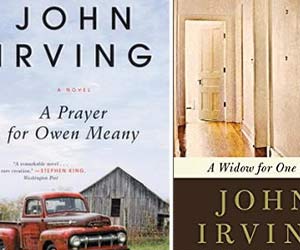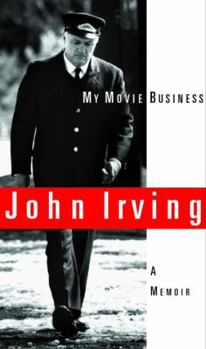My Movie Business: A Memoir
Select Format
Select Condition 
Book Overview
After two producers, four directors, thirteen years, and uncounted rewrites, the movie version of John Irving's acclaimed novel, The Cider House Rules , at last made it to the big screen. Here is the... This description may be from another edition of this product.
Format:Hardcover
Language:English
ISBN:0375503684
ISBN13:9780375503689
Release Date:November 1999
Publisher:Random House (NY)
Length:192 Pages
Weight:0.90 lbs.
Dimensions:0.7" x 5.6" x 9.4"
Customer Reviews
5 ratings
A wish come true
Published by Thriftbooks.com User , 22 years ago
How many times have I wished I could call an author and ask: "Why did you write that?" How many times have i read a book and loved it, only to hate the movie based on it? I lose count. Well, John Irving answered my prayers, and in one short book replied to all of my questions and to a few more I didn't even know I had. I am a huge fan of Irving. He writes like nobody can; he also takes himself very unseriously. I have enjoyed all of his books immensely. This one was a joy from beginning to end. For starters, it gives a fascinating insight into The Cider House Rules. He explains his characters, goes through the thought process that made him write the book this or that way.This memoir explains very well why it is almost always impossible to transform a book into a movie script verbatim. Irving goes through the painful steps that he took to make The Cider House Rules into a successful movie. It was wonderful to read about the back and forth that Irving had with the director of the film, Lasse Hallstrom. It makes me think that making a movie based on a book is more than anything a labor of negotiation. For me, one of the most poignant moments of this memoir is when Irving tells why he chose the role of the stationmaster. "I just wanted to be there, in the stationmaster's wretched persona, to see Homer get off that train." As an author, this was probably a brilliant moment in his life, seeing his characters in the flesh. Irving not only reminisces about the trials and tribulations he had to endure to see this book into a movie. He also writes about writing some of his other novels, and bringing them to film, and as always, about his sons. He also offers an unusual insider's account of what it is to be immersed in the movie world. So much of what we know is based on glossy magazines and celebrity TV programs, when the reality is far more crude and plain. Well, no one better than this man to do a bit of reporting, straight from the trenches. This is a book you must read only after reading AND watching The Cider House Rules. Only then could you do it justice.
Movie or book?
Published by Thriftbooks.com User , 24 years ago
This is a book for those that say, " the book was better than the movie." Irving relates many of the alternitive choices and reasons in cutting a big book into something "marketable." Who is in or out, which of your offspring are you willing to sacrifice for the common good, something a writer- screenwriter is loath to do. This is an education for those not conversant with movie making with allits permutations. Read the Novel, read this book, and see the movie. Ask yourself how you would have done it.Thank You, John Irving
Insightful and Fun
Published by Thriftbooks.com User , 24 years ago
I loved this book. I am, admittedly, an avid John Irving fan, and to finally have a book not only by, but about him was thrilling. It is so nice to finally get a glimpse of the man behind the novels. What an interesting person! He is witty, intelligent, and engaging. The only thing I regret is that he included only two stanzas of his grandfather's infamous poem. I am very eager to read it in it's entirety. Hopefully, Mr. Irving will include it in a future book. This memoir, while short, was very informative, and even persuaded me to consider seeing the movie. In general I refuse to see movies that are based on novels, especially if they are novels I enjoyed. However, since Irving explains his motives for cutting out certain characters, as well as the other changes he made to the plot, I am prepared for an equally beautiful, if different, story. Overall, I enjoyed every aspect of this book, from the history of abortion in the United States to the digressions about other novels of his. A fine book, and a fascinating person! Highly recommended.
"Candid, humorous, insightful and informative..."
Published by Thriftbooks.com User , 25 years ago
Most readers are aware that John Irving ("A Widow For One Year," "A Son of the Circus") is a best-selling writer of novels. What they may not know is that Irving has been involved with the "movie business" since his first novel, "Setting Free the Bears," was published in 1968. "My Movie Business" details Irving's interactions with Hollywood since then, but focuses mainly on his thirteen year attempt to bring his screenplay of "The Cider House Rules" to the Silver Screen. The result is an insightful look into the difficulties an artist endures while reshaping one medium (the novel) to fit another (films). Because "The Cider House Rules" (screenplay and novel) relies on the subject of abortion as a central issue, Irving starts his memoir by telling us about his grandfather, Dr. Frederick C. Irving. Not only was Dr. Irving chief of staff at Boston Lying-In (one of the world's leading obstetrical hospitals in the early 1900's), he was a writer who cobbled up numerous limericks (many of which live on through medical students) and published three books. Irving's quotes from his grandfather's reveal a "Victorian prose" style that (along with the novels of Charles Dickens) belie an early influence. In writing about grandfather, Irving succinctly sums up his own creed as a novelist: "Grandfather was a man of extreme erudition and unaccountable, even inspired, bad taste; as such, he would have been a terrific novelist, for a good novel is at once sophisticated in its understanding of human behavior and utterly rebellious in its response to the conventions of good taste." Irving uses most of the first nine chapters to educate the reader on the history of abortions in America, detailing his grandfather's personal involvement as well. The author even goes so far as to take a stand on the Right-to-Life movement: "Let doctors practice medicine. Let religious zealots practice their religion, but let them keep their religion to themselves." From there, the author delves into the business of drafting screenplays for Hollywood. It is, Irving realizes, a business of compromise. During the course of developing the film and writing the screenplay, Irving works with no less than four directors (the last one, Lasse Halstrom, saw the film to completion). And in order to make more room for the relationship between Dr. Larch and Homer Wells, Irving has to excise at least one major character and lose all of Homer's history as an orphan. Forced to cut more portions of the film (to make it more stream-lined), he finds that all attempts at humor are lost. As Irving writes, "...these scenes were a comic interlude that would have...reminded my readers of the tone of my novels." In typical Irving fashion, there are digressions, albeit interesting ones. Such as the story about his relationship with Irving Kirshner, who was to direct "Setting Free the Bears"; or that Paul Newman was approached to play Dr. Larch, but was uncomf
"a hair-raising revelation..."
Published by Thriftbooks.com User , 25 years ago
It only took John Irving ("A Widow For One Year," "A Son of the Circus") thirty years to break into the movie business. His first attempt cam in 1968, when he was hired to draft a screenplay for his first novel, "Setting Free the Bears." Since that time, Irving has seen three of his novels turned into films, written one original (but, as of yet, unproduced screenplay) and spent thirteen years shepherding his screenplay of "The Cider House Rules" onto the Silver Screen. "My Movie Business" is a record of all that, and more. Because "The Cider House Rules" (screenplay and novel) relies on the subject of abortion as a central issue, Irving starts his memoir by telling us about his grandfather, Dr. Frederick C. Irving. Not only was Dr. Irving chief of staff at Boston Lying-In (one of the world's leading obstetrical hospitals in the early 1900's), he was a writer who cobbled up numerous limericks (many of which live on through medical students) and published three books. Irving's quotes from his grandfather's reveal a "Victorian prose" style that (along with the novels of Charles Dickens) belie an early influence. In writing about grandfather, Irving succinctly sums up his own creed as a novelist: "Grandfather was a man of extreme erudition and unaccountable, even inspired, bad taste; as such, he would have been a terrific novelist, for a good novel is at once sophisticated in its understanding of human behavior and utterly rebellious in its response to the conventions of good taste." Irving uses most of the first nine chapters to educate the reader on the history of abortions in America, detailing his grandfather's personal involvement as well. The author even goes so far as to take a stand on the Right-to-Life movement: "Let doctors practice medicine. Let religious zealots practice their religion, but let them keep their religion to themselves." From there, the author delves into the business of drafting screenplays for Hollywood. It is, Irving realizes, a business of compromise. During the course of developing the film and writing the screenplay, Irving works with no less than four directors (the last one, Lasse Halstrom, saw the film to completion). And in order to make more room for the relationship between Dr. Larch and Homer Wells, Irving has to excise at least one major character and lose all of Homer's history as an orphan. Forced to cut more portions of the film (to make it more stream-lined), he finds that all attempts at humor are excised. As Irving writes, "...these scenes were a comic interlude that would have...reminded my readers of the tone of my novels." In typical Irving fashion, there are digressions, albeit interesting ones. Such as the story about his relationship with Irving Kirshner, who was to direct "Setting Free the Bears"; or that Paul Newman was approached to play Dr. Larch, but was uncomfortable with scenes involving an incinerator; and Irving includes his feeling
My Movie Business: A Memoir Mentions in Our Blog

The Essential John Irving
Published by Ashly Moore Sheldon • March 01, 2021
This week we celebrate the birthday of acclaimed American-Canadian author John Irving, born on March 3, 1942. With a career that has spanned five decades, his work is marked by a tension between tradition and nonconformity, reverence and rebellion. Here we highlight five of his essential titles, as well as their screen adaptations.





